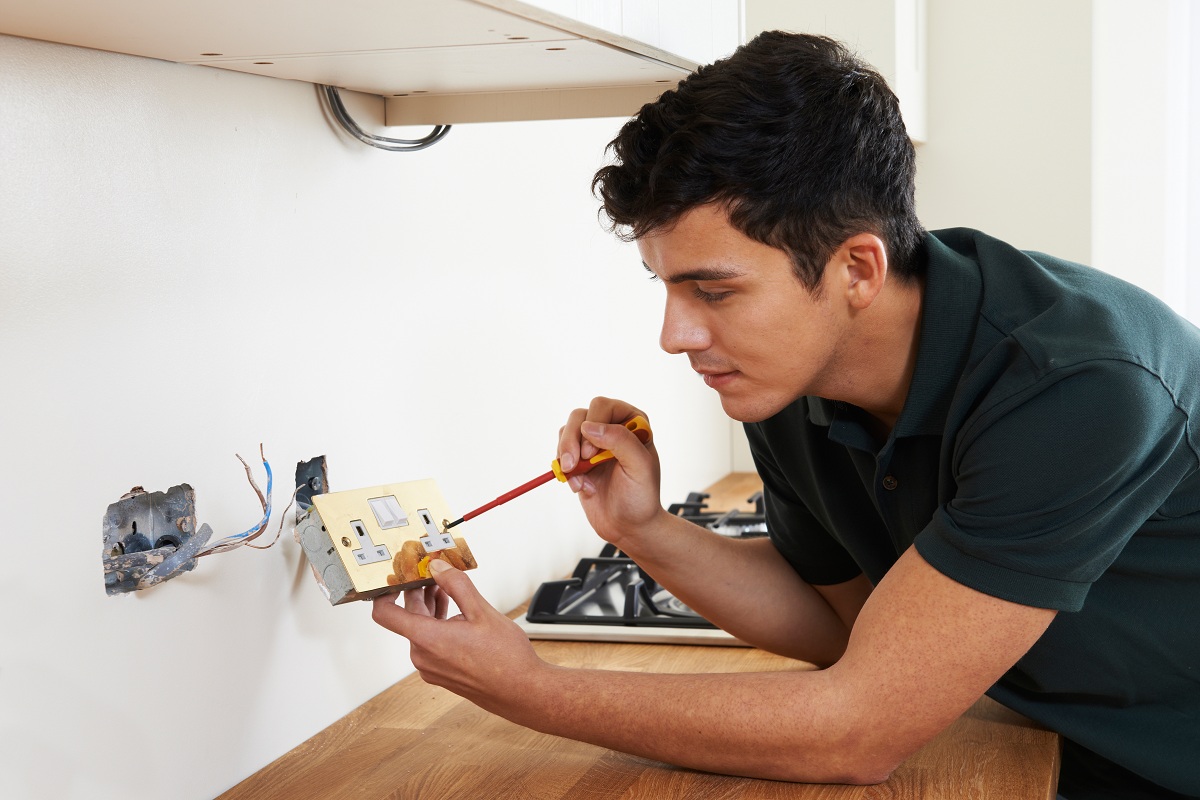Performing simple electrical repairs at home can save you time and money while also empowering you to address minor electrical issues safely. This article provides a step-by-step guide to tackling basic electrical repairs within your home. From handling circuit breakers to replacing outlets and switches, this article offers practical tips and precautions to ensure successful and safe repairs without the need for professional intervention.
Introduction: Having the confidence to address minor electrical issues at home is both empowering and practical. This article aims to guide homeowners through simple electrical repairs, emphasizing safety and providing clear instructions.
Understanding Electrical Safety:
- Safety Precautions: Before attempting any repair, ensure you turn off the circuit breaker to the affected area.
- Safety Gear: Always wear appropriate safety gear, such as insulated gloves and safety glasses, to protect yourself from potential hazards.
Common Electrical Repairs:
- Replacing a Broken Outlet:
- Turn off the circuit breaker to the outlet.
- Remove the outlet cover and unscrew the outlet from the electrical box.
- Disconnect the wires from the old outlet and reconnect them to the new one.
- Attach the new outlet to the electrical box and secure it.
- Replace the outlet cover and restore power.
- Changing a Faulty Light Switch:
- Turn off the circuit breaker to the switch.
- Remove the switch cover and unscrew the switch from the electrical box.
- Note the wire connections on the old switch and transfer them to the new switch.
- Attach the new switch to the electrical box and secure it.
- Replace the switch cover and restore power.
- Fixing a Tripped Circuit Breaker:
- Open the circuit breaker panel and locate the tripped breaker.
- Turn the breaker fully to the “off” position before resetting it to the “on” position.
Replacing a Blown Fuse:
- Locate the fuse box and identify the blown fuse.
- Turn off the main power switch.
- Replace the blown fuse with one of the same amperage rating.
- Turn the main power switch back on.
Replacing a Faulty Light Bulb:
- Ensure the light switch is turned off before replacing the bulb.
- Allow the old bulb to cool down before carefully unscrewing it.
- Screw in a new bulb of the appropriate wattage.
Performing basic electrical repairs at home can be a rewarding and practical skill, saving you both time and money. By understanding safety precautions, following step-by-step instructions, and taking care to turn off power sources, homeowners can confidently address minor electrical issues on their own. However, it’s important to note that more complex electrical problems should be addressed by a licensed electrician to ensure safety and compliance with local codes. Always prioritize safety and exercise caution when dealing with electricity.
Understanding Electricity and Essential Safety Measures When Dealing with Electrical Work
Electricity is a powerful and indispensable force that fuels our modern world. While engaging with electrical systems can be necessary and beneficial, it also requires a high level of caution and respect. This article explores the fundamentals of electricity, its uses, and the potential dangers associated with improper handling. It provides crucial insights into the behaviors to avoid when dealing with electrical work to ensure the safety of individuals, property, and the surrounding environment.
Introduction: Electricity is an essential component of our daily lives, but its potential hazards demand responsible and careful interaction. This article sheds light on the nature of electricity and the precautions necessary to prevent accidents during electrical work.
Understanding Electricity:
- Electrical Current: The flow of charged particles (electrons) through a conductor, such as wires, powering devices and systems.
- Voltage: The force that drives electrons through a circuit, measured in volts.
- Safety in Electrical Work: Prioritizing safety is paramount when working with electricity to prevent accidents and injuries.
Common Mistakes and Unsafe Behaviors:
- Working Without Knowledge: Attempting electrical work without proper knowledge and training increases the risk of accidents.
- Ignoring Safety Gear: Neglecting to wear appropriate safety gear, such as gloves and goggles, exposes you to potential hazards.
- Overloading Circuits: Overloading circuits by connecting too many devices can lead to overheating, fires, and electrical failures.
- Unsafe Wiring Practices: Poor wiring techniques, such as improper connections and exposed wires, can cause electrical shocks and fires.
- Working on Live Circuits: Performing electrical work on live circuits increases the risk of shocks, burns, and fatalities.
- Using Improper Tools: Using non-insulated tools or tools not designed for electrical work can lead to accidents.
- Neglecting Grounding: Failing to ground electrical systems properly increases the risk of electrocution and equipment damage.
Essential Safety Measures:
- Turn Off Power: Always turn off the circuit breaker or disconnect power sources before starting electrical work.
- Test Circuits: Use a voltage tester to confirm that circuits are de-energized before working on them.
- Proper Wiring: Ensure wires are correctly connected, insulated, and secured to prevent hazards.
- GFCI Outlets: Install Ground Fault Circuit Interrupter (GFCI) outlets in wet areas to prevent electrocution.
- Childproof Outlets: Install childproof outlets or covers to prevent young children from inserting objects into sockets.
- Regular Inspections: Regularly inspect wiring, outlets, and devices for signs of damage or wear.
Seeking Professional Help:
- Complex Repairs: When dealing with complex electrical repairs or installations, it’s best to consult a licensed electrician.
- Local Codes: Ensure your work complies with local electrical codes and regulations.
Electricity is a marvel of modern science, but its potential hazards require a responsible and cautious approach when dealing with electrical work. By understanding the basics of electricity, prioritizing safety measures, and avoiding common mistakes, individuals can mitigate risks and create a secure environment when engaging with electrical systems. Always remember that safety should be the top priority in any electrical endeavor, and seeking professional help when necessary ensures the well-being of everyone involved.


















